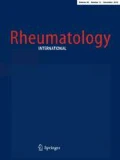Abstract
Knee Injury and Osteoarthritis Outcome Score (KOOS) is a commonly used instrument to assess the symptoms and functional status in people with knee injuries, including knee osteoarthritis. While China ranked the top country in the absolute number of people aged 65 or above, yet there is no validated Chinese version of this outcome measurement. This study translated and validated the KOOS into Chinese version. Chinese KOOS was translated from the original English version following standard forward and backward translation procedures recommended by the International Society for Pharmacoeconomics and Outcomes Research. Survey was then conducted in clinical settings by a questionnaire comprised Chinese KOOS, WOMAC Osteoarthritis Index, and Short Form 36 health survey (SF-36). One hundred Chinese reading patients with knee osteoarthritis were recruited from the orthopaedic out-patient department in hospitals. Internal consistency of the instrument was measured by Cronbach alpha. Construct validity was examined by Spearman’s rank correlation coefficient (ρ) tests by comparing its score with the validated Chinese version of WOMAC Osteoarthritis Index and SF-36, while the test–retest reliability was evaluated by administering the questionnaires twice. Cronbach alpha values of individual questions and its overall value were above 0.70. Fairly strong association was found between the Chinese KOOS and the WOMAC Osteoarthritis Index (ρ = −0.37 to −0.86, p < 0.001). Diverse relationship was observed between Chinese KOOS and SF-36. Excellent test–retest reliability (ICC = 0.89–0.92) was demonstrated. The Chinese translated version of KOOS is a reliable and valid instrument for patients with knee osteoarthritis. The findings of current study might promote multinational investigations in this patient group.
References
Murphy L, Schwartz TA, Helmick CG et al (2008) Lifetime risk of symptomatic knee osteoarthritis. Arthritis Rheum 59:1207–1213. doi:10.1002/art.24021
Fransen M, Bridgett L, March L et al (2011) The epidemiology of osteoarthritis in Asia. Int J Rheum Dis 14:113–121. doi:10.1111/j.1756-185X.2011.01608.x
Roos EM, Roos HP, Lohmander LS et al (1998) Knee Injury and Osteoarthritis Outcome Score (KOOS)—development of a self-administered outcome measure. J Orthop Sports Phys Ther 28:88–96
Davis AM, Perruccio AV, Canizares M et al (2009) Comparative, validity and responsiveness of the HOOS-PS and KOOS-PS to the WOMAC physical function subscale in total joint replacement for osteoarthritis. Osteoarthr Cartil OARS Osteoarthr Res Soc 17:843–847. doi:10.1016/j.joca.2009.01.005
Roos EM (2016) KOOS homepage. http://www.koos.nu/index.html. Accessed 4 July 2016
Wild D, Grove A, Martin M et al (2005) Principles of good practice for the translation and cultural adaptation process for patient-reported outcomes (PRO) measures: report of the ISPOR Task Force for Translation and Cultural Adaptation. Value Health J Int Soc Pharmacoecon Outcomes Res 8:94–104. doi:10.1111/j.1524-4733.2005.04054.x
Xie F, Li S-C, Goeree R et al (2008) Validation of Chinese Western Ontario and McMaster Universities Osteoarthritis Index (WOMAC) in patients scheduled for total knee replacement. Qual Life Res Int J Qual Life Asp Treat Care Rehabil 17:595–601. doi:10.1007/s11136-008-9340-7
Lam CL, Gandek B, Ren XS, Chan MS (1998) Tests of scaling assumptions and construct validity of the Chinese (HK) version of the SF-36 Health Survey. J Clin Epidemiol 51:1139–1147
Terwee CB, Bot SDM, de Boer MR et al (2007) Quality criteria were proposed for measurement properties of health status questionnaires. J Clin Epidemiol 60:34–42. doi:10.1016/j.jclinepi.2006.03.012
Portney LG, Watkins MP (2008) Foundations of clinical research. Applications to practice. Pearson Education Inc., Upper Saddle River, New Jersey, USA
Ware JE, Gandek B (1998) Methods for testing data quality, scaling assumptions, and reliability: the IQOLA Project approach. International quality of life assessment. J Clin Epidemiol 51:945–952
Salavati M, Mazaheri M, Negahban H et al (2008) Validation of a Persian-version of Knee injury and Osteoarthritis Outcome Score (KOOS) in Iranians with knee injuries. Osteoarthr Cartil OARS Osteoarthr Res Soc 16:1178–1182. doi:10.1016/j.joca.2008.03.004
Fayers PM, Machin D (2000) Questionnaire development and scoring. In: Quality of life: assessment, analysis and interpretation. John Wiley, Chichester, UK. doi:10.1002/0470846283.ch7
Bize R, Johnson JA, Plotnikoff RC (2007) Physical activity level and health-related quality of life in the general adult population: a systematic review. Prev Med 45:401–415. doi:10.1016/j.ypmed.2007.07.017
Xie F, Li S-C, Roos EM et al (2006) Cross-cultural adaptation and validation of Singapore English and Chinese versions of the Knee injury and Osteoarthritis Outcome Score (KOOS) in Asians with knee osteoarthritis in Singapore. Osteoarthr Cartil OARS Osteoarthr Res Soc 14:1098–1103. doi:10.1016/j.joca.2006.05.005
Roos EM, Lohmander LS (2003) The Knee injury and Osteoarthritis Outcome Score (KOOS): from joint injury to osteoarthritis. Health Qual Life Outcomes 1:64. doi:10.1186/1477-7525-1-64
Roos EM, Roos HP, Ekdahl C, Lohmander LS (1998) Knee injury and Osteoarthritis Outcome Score (KOOS)—validation of a Swedish version. Scand J Med Sci Sports 8:439–448
Gonçalves RS, Cabri J, Pinheiro JP et al (2010) Reliability, validity and responsiveness of the Portuguese version of the Knee injury and Osteoarthritis Outcome Score—Physical Function Short-form (KOOS-PS). Osteoarthr Cartil OARS Osteoarthr Res Soc 18:372–376. doi:10.1016/j.joca.2009.10.012
Salavati M, Akhbari B, Mohammadi F et al (2011) Knee injury and Osteoarthritis Outcome Score (KOOS); reliability and validity in competitive athletes after anterior cruciate ligament reconstruction. Osteoarthr Cartil OARS Osteoarthr Res Soc 19:406–410. doi:10.1016/j.joca.2011.01.010
Author information
Authors and Affiliations
Corresponding author
Ethics declarations
Conflict of interest
None.
Electronic supplementary material
Below is the link to the electronic supplementary material.
Supplementary material 1
Chinese version of the Knee Injury & Osteoarthritis Outcome Score (DOCX 23 kb)
Rights and permissions
About this article
Cite this article
Cheung, R.T.H., Ngai, S.P.C. & Ho, K.K.W. Chinese adaptation and validation of the Knee Injury and Osteoarthritis Outcome Score (KOOS) in patients with knee osteoarthritis. Rheumatol Int 36, 1449–1454 (2016). https://doi.org/10.1007/s00296-016-3539-7
Received:
Accepted:
Published:
Issue Date:
DOI: https://doi.org/10.1007/s00296-016-3539-7

